1
Years of emigration from China sent off hundreds of thousands of Chinese into environments that were foreign and often hostile. In many of these destinations, Chinese developed associations to help navigate the intricacies of their new lives. In Moose Jaw, the Chinese Benevolent Society (probably established by the earliest Chinese immigrants) and the Chinese Athletic Club (established in 1961) were the two principle organizations that helped new arrivals get settled and bring people together through the years.
2
Innaugeration of the Chinese Athletic Club
1961
37 High Street West, Moose Jaw, Saskatchewan
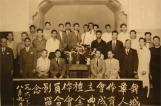
3
University student party time at the Chinese Athletic Club
1969
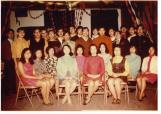
4
The Chinese Athletic Club had more of a social basis than other organizations; its origin can be traced to young men getting together after church services on Sundays for recreational activity. The Chinese Athletic Club was preceded by an organization referred to as the Chinese YMCA.
5
Reverend E. J. Chegwin and volleyball team
1920
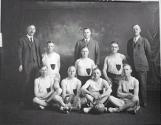
6
In its early years, the Chinese Athletic Club's members were almost exclusively male, sponsoring men's basketball and volleyball teams that played in leagues in Regina and Saskatoon. Spouses became members by association.
7
Crest from 1976 Olympic coat
1976
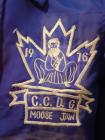
8
Later on, more inclusive activities were added, such as women and children's traditional Chinese dancing, as well as tai-chi, which produced a dance troupe that performed at the Montreal Olympics.
9
Men and boys in front of the Woo, Chan, Yuen surname association
1920
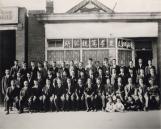
10
Clan associations performed a similar function, but only for the members of a particular surname. Members of the same surname tended to come from the same general area in China and, even if they were not blood relations, were often treated as such.
11
In Moose Jaw, families of the same surname got together once a year for a banquet dinner, which was often held at a restaurant run by someone of that family. In more recent years, however, the decline in population has led to a decline in clan-associated activity in Moose Jaw, although there are families who continue to be active in their Canada-wide chapters.
12
Emporer opera costume
1950

13
Perhaps the most memorable activities were the traditional Chinese operas, performed by and for the Chinese community several times a year. At the Association premises at 37 High Street West, members built a stage and furnished it with props and backdrops in their free time. Costumes were brought over from Hong Kong for the performances.
14
Emporer opera costume with instruments
1950
